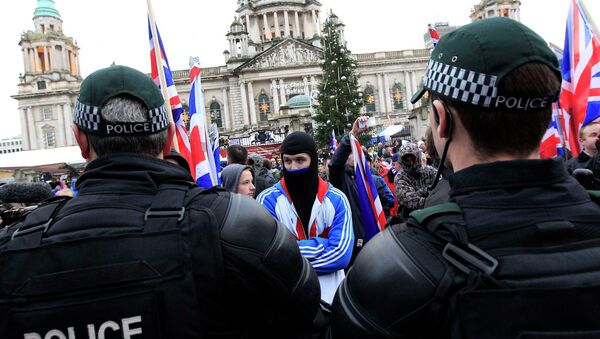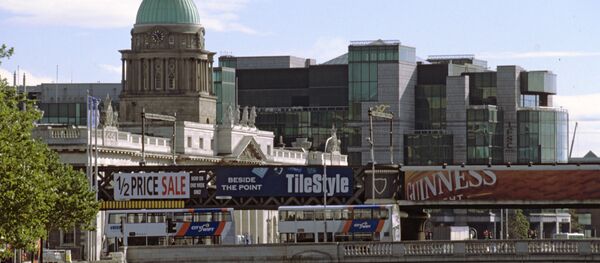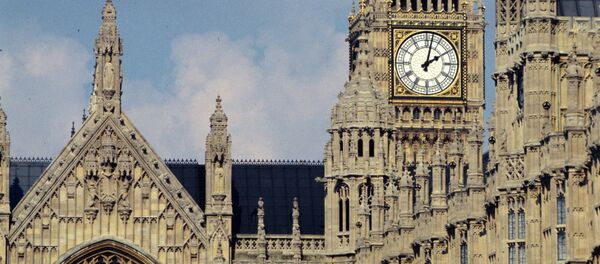MOSCOW, December 11 (Sputnik) — UK Prime Minister David Cameron and his Irish counterpart Enda Kenny have met Thursday for the negotiations aimed at overcoming the mutual mistrust regarding the issue of the Northern Ireland and the political controversies surrounding it, like rallies, flags display and expressions of mutual hostility.
Northern Ireland, or Ulster, being essentially a part of the UK as a slight majority of its population are Protestants, has long been a stumbling point in the UK-Irish relations. There is a large nationalist minority in Ulster, demanding a reunification with Ireland. The sectarian standoff escalated to explicit violence in the past, known as the Troubles, lasting from 1960s up to 1998 and, on a smaller scale, beyond that date up till now. The tense relations between the Catholics and the Protestants prompted the construction of the infamous Belfast Wall, perceived by some Leftist commentators as a ‘divide et impera’ tactic of the London government, while the UK claims the Peace Lines were constructed to ensure safety of both Protestants and Catholics from each other’s violent actions.
The Ulster talks are continuing amid the instability in Belfast, where the local authorities recently banned the pro-UK Protestant street march of the Orange Order, triggering violent street clashes as if it was 1970s again. At the same time, Belfast City Council limited the amount of days the UK national banner is allowed to be displayed over City Hall. It is about high time for Cameron and Kenny to intervene as the pro-union Protestants are quickly radicalizing, possibly bearing a potential for further destabilization in the region.
What the British prime minister is missing is that the recent clashes have shown that Good Friday accord does not work anymore as sectarian hostilities and intolerance are on the rise in Ulster, the fact the local police tend to neglect.
@EbpbFB @GertrudeStarFB pic.twitter.com/y8v40GlNZU
— Gary G ✩ ✩ ✩ ✩ ✩ (@UlstersNumber1) 28 октября 2014
As opposed to the 1970s situation, when the Irish nationalists and the IRA-affiliated groups contributed the most to the political instability, today the Protestants are more active in a struggle to protect their rights as they feel oppressed. The Catholics, on their part, are seeking a new agreement, possibly extending their grip at political power in Ulster.
Massive commitment needed by Brit & Irish govts to secure comprehensive agreement http://t.co/zQFW2hWdUG @rtenews @NewstalkFM @TodayFMNews
— An Phoblacht (@An_Phoblacht) December 11, 2014
In such a context, Cameron’s words mean that he is not coming to the talks to defend the pro-Unionist stance of the Irish Protestants. Instead, he, along with the governments in America and Ireland, is more interested is keeping the multi-partisan peace talks going on, hoping they will stave off the intolerance and the growing distrust of the local Protestants to the government in Belfast.
“That means they (the UK, the US and Ireland) are more likely to give concessions to those (parties) who will make an agreement than those who try to break it,” says Liam Clarke of Belfast Telegraph.
“The British Government, and the others, don't want people who are right, they want team players,” Clarke argues.
So far, the UK government is intending to implement a fiscal reform in Northern Ireland, giving the local authorities more control of the regional budget, including the right to manage corporate tax. This would be a significant concession to the nationalists as the growing pro-Irish Catholic community has recently secured its first majority on Belfast city council. If the UK turn cold shoulder on the pro-Unionist Protestants, they will be further radicalized, spurring even more street violence and political turmoil.
The Belfast Wall currently costs London an estimated 120,000 GBP ($190,000) to 1.5 bln GBP ($2.36 bln) per year in maintenance.




